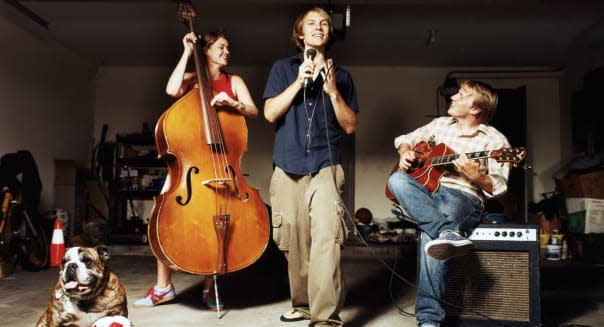If You Make Music, You Can Make Money

You may have never heard of my nephew's metal band, but it got a lot easier earlier this month to check it out. Miami-based Naked Vengeance -- the rock band in which my nephew David Ulloa shreds as its lead guitarist -- put out three singles on iTunes, Spotify and other leading digital music services.
The band didn't sign a major label recording contract. You don't need that these days, though it obviously doesn't hurt. If you have original music, it's just a matter of registering with TuneCore, CD Baby, SongCast or any of the other platforms that help get your tunes into the growing number of digital storefronts.
It's not free. TuneCore charges artists $30 to distribute an entire digital album for the first year. Renewals are $50 after that. Singles will set a composer back $10. SongCast has a different pricing structure: It charges a one-time fee of $20 for every album and $10 for every single. It then charges a monthly maintenance fee of $6 a month or $59.90 a year. CD Baby charges a flat fee of $49 an album and it also specializes in CD distribution.
Artists may never make that money back in subsequent royalties, but it's a small price to pay to have your demo available -- one click away -- all around the world.
Pumping Up the Volume
I had to do it the old-fashioned way a generation ago. I was in a band -- Paris By Air -- that had to shop our demo around to get noticed. We finally got the attention of producer Lewis Martinee, and under his leadership got signed to Columbia Records.
%VIRTUAL-WSSCourseInline-963%We put out a couple of singles that charted on Billboard's club play chart. We traveled the country in support. Columbia Records eventually cut us loose. However, we had dozens of unreleased tracks. Most of the songs went unheard outside of friends and family, but then the Internet offered up sites including the original MP3.com, IUMA and SoundClick that made digital delivery a means to discovery. That paved the way for Apple's (AAPL) iTunes, Pandora (P) and Spotify as the leading royalty-generating platforms of today.
Paris By Air was played on the radio and in dance clubs around the world while we were signed to Columbia Records, but we have probably reached more listeners in the era of digital self-distribution.
Come as You Are
The digital distribution marketplaces don't discriminate. It doesn't matter if your garage band never got out of the garage or if your singing is off-key. Outside of Pandora -- which does screen submissions that are sent directly to the music discovery site -- the sites embrace submissions with open eardrums. The marketplace will decide what it likes, and it can add up over time. TuneCore claims to have collected more than $541 million in revenue for its artists through 15.2 billion cumulative streams and downloads since the site launched in 2006.
In the end, it certainly helps if you're good -- like my nephew's band Naked Vengeance. It also helps if you're savvy in terms of promotions and social media. After all, having your music online is just half the battle. Getting folks to listen to it is the ultimate goal, and that will take more work than just uploading a few songs to a digital distribution site. If you want to get heard, make it happen.
Motley Fool contributor Rick Munarriz is proud of his work with Paris By Air, but he has no position in any stocks mentioned. The Motley Fool recommends and owns shares of Apple and Pandora Media. Try any of our Foolish newsletter services free for 30 days. Check out our free report on one great stock to buy for 2015 and beyond.

